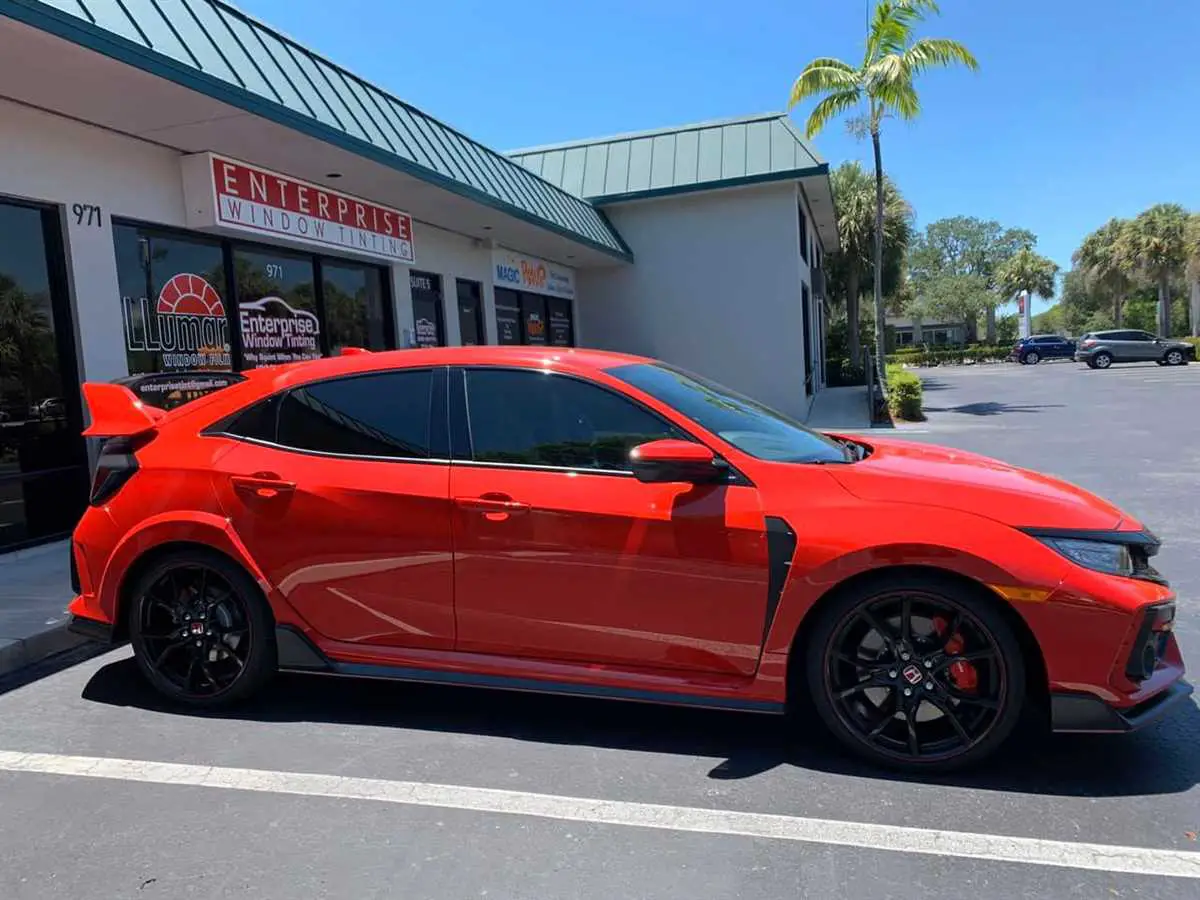Last Updated on February 2, 2024 by Vadym

Have you recently tinted the windows of your car and are now wondering if you can still use the air conditioning?
Tinting the windows of your car not only enhances its appearance but also provides several functional benefits. It helps to block out harmful UV rays, reduces glare, and keeps the interior of your vehicle cooler. However, many car owners are unsure whether they can still use their air conditioning after getting their windows tinted.
The good news is that you can absolutely use the AC after tinting your windows! Tinting is typically applied to the interior side of the windows, which means it doesn’t interfere with the functioning of the air conditioning system. You can still enjoy the cool and refreshing breeze from your AC while benefiting from the added privacy and protection that window tinting provides.
It’s important to note that the effectiveness of your AC may vary slightly after tinting the windows. The tint film can reduce the amount of sunlight entering your car, which in turn can help keep the interior cooler. This means that your AC may not need to work as hard to cool down the cabin, resulting in potentially improved fuel efficiency.
If you have recently tinted your windows and notice that your car is not cooling as quickly as before, don’t worry. It’s normal for the AC to take a little longer to cool down the vehicle due to the reduced heat entering through the tinted windows. Once the interior reaches a lower temperature, the AC will maintain the cooling just as efficiently as before.
In conclusion, tinting your car windows doesn’t affect the functionality of your air conditioning. You can still enjoy the comfort of a cool interior while reaping the benefits of window tinting. Just sit back, relax, and let the AC do its job!
Benefits of Tinting Windows
Tinting windows can provide a range of benefits for both residential and commercial properties. Here are some of the main advantages:
1. Heat Reduction: One of the primary benefits of tinting windows is heat reduction. Window film can help to block out a significant amount of the sun’s heat, reducing the amount of heat that enters a building. This can lead to a more comfortable indoor environment and can also help to lower energy costs by reducing the need for air conditioning.
2. UV Radiation Protection: Window tinting can help to block out harmful ultraviolet (UV) radiation from the sun. This is important for protecting your skin and eyes from the damaging effects of UV rays. Additionally, tinting can help to prevent fading and damage to furniture, flooring, and other items that may be exposed to sunlight.
3. Glare Reduction: Tinting windows can significantly reduce glare from the sun, making it easier to see and work on electronic devices, such as computers and televisions. This can enhance productivity and improve the overall comfort and visibility within a space.
4. Increased Privacy: Window tinting can provide an additional layer of privacy by reducing the ability for people outside to see into your home or office. This can be particularly beneficial for ground floor rooms, buildings near busy areas, and spaces where privacy is essential.
5. Enhanced Security: Tinted windows can provide an added level of security by making it more difficult for potential intruders to see into a building or vehicle. This can deter theft and vandalism and can provide peace of mind for homeowners and business owners.
6. Energy Efficiency: Tinting windows can help to improve the energy efficiency of a building by reducing the amount of heat that enters or escapes through the windows. This can help to reduce the load on HVAC systems, leading to lower energy costs and a reduced carbon footprint.
Conclusion: Overall, tinting windows can offer a range of benefits, including heat reduction, UV radiation protection, glare reduction, increased privacy, enhanced security, and improved energy efficiency. Whether for residential or commercial properties, window tinting is an investment that can provide long-lasting advantages.
Effect of Tinting on Car’s AC
Tinting car windows can have some effects on the performance of the car’s air conditioning (AC) system. While tinting is primarily done to provide privacy, reduce heat and glare, it can affect the AC system in a couple of ways:
- Reduced Cooling Efficiency: Tinted windows can reduce the amount of sunlight entering the car, which means less heat is transferred into the interior. While this can help keep the car cooler, it can also put less load on the AC system. As a result, the AC may not have to work as hard to maintain the desired temperature, leading to reduced cooling efficiency.
- Increased AC Usage: Some people may compensate for the reduced cooling efficiency by using the AC more frequently or at higher settings. This can lead to increased wear and tear on the AC system over time, potentially causing it to work harder and consume more energy.
It is important to note that the effect of tinting on the AC system may vary depending on the type and quality of the tint used, as well as the overall condition of the car’s AC system. High-quality tints that are specifically designed for automotive use may have less impact on the AC system compared to lower-quality tints.
Additionally, proper installation of the tint is crucial to minimize any potential negative effects on the AC system. If the tint is not properly installed and creates gaps or bubbles, it can interfere with the flow of air from the AC vents, reducing its overall effectiveness.
In summary, tinting car windows can have some impact on the performance of the AC system. While it may reduce the cooling efficiency, the extent of the impact will depend on various factors. It is recommended to consult with a professional tinting service and keep the AC system properly maintained to ensure optimum performance.
Can You Use AC Immediately After Tinting
After tinting your windows, it is recommended to wait before using the air conditioning system in your vehicle. This waiting period allows the tint to fully bond to the glass and ensures that it will not be damaged or peeled off by the airflow from the AC vents. The exact waiting time may vary depending on the type of tint used and the climate conditions.
Using the AC immediately after tinting can create air pressure changes and temperature fluctuations, which can interfere with the proper bonding process. It is best to give the tinting film enough time to dry and set before exposing it to the constant airflow produced by the AC system.
Typically, automotive window tinting professionals advise waiting at least 24 to 48 hours after tint installation before using the AC. This allows the tint to cure properly and ensures optimal results. It is important to follow the specific instructions provided by the tinting professional to ensure the longevity and effectiveness of the tint.
In addition to avoiding the use of AC immediately after tinting, it is also recommended to avoid rolling down the windows during the initial curing period. Rolling down the windows can create stress on the tint and may cause it to peel or bubble.
Overall, it is crucial to exercise patience and allow the tinting film to fully bond and cure before using the AC in your vehicle. This ensures that you will enjoy the benefits of both tinted windows and a properly functioning air conditioning system.
Precautions to Take After Tinting
After tinting your windows, it’s important to take some precautions to ensure the tinting film sets properly and lasts a long time. Here are some important steps to follow:
|
1. Avoid rolling down the windows For the first few days after tinting, it’s best to avoid rolling down the windows. This allows the adhesive to fully bond and prevents any damage to the film. If you need to lower the windows, do so with caution and avoid doing it repeatedly. |
|
2. Be gentle when cleaning When cleaning your tinted windows, use a mild glass cleaner and a soft, non-abrasive cloth. Avoid using any products that contain ammonia, as it can damage the tinting film. Gently wipe the windows without applying too much pressure or scrubbing. |
|
3. Avoid using stickers or decals Applying stickers or decals directly onto the tinted windows can cause damage to the film and may be difficult to remove later on. If you need to display any stickers or decals, consider placing them on the outside of the glass or finding alternative spots. |
|
4. Allow time for curing Tinting film takes time to fully cure and adhere to the windows. It’s recommended to wait at least a week before washing the windows or exposing them to heavy rain. This allows the film to set properly and ensures its longevity. |
|
5. Avoid sharp objects Be cautious when handling sharp objects near the tinted windows, such as keys, rings, or tools. Scratches or punctures in the film can compromise its effectiveness and appearance. Take extra care when loading or unloading items from your vehicle. |
|
6. Seek professional help if needed If you notice any issues with the tinting film, such as air bubbles, peeling, or discoloration, it’s best to seek professional help. Trying to fix the problem yourself may cause further damage to the film, and a trained technician will be able to assist you properly. |
By following these precautions, you can ensure that your tinted windows remain in good condition and provide the desired benefits for a long time.
How Tinting Affects Car’s Cooling
Window tinting can have a significant impact on a car’s cooling capabilities, especially during hot summer months. While tinted windows provide several benefits, they may also affect the cooling system of the car.
Tinted windows help in reducing the amount of heat that enters the car. They can block a significant portion of the sun’s rays, preventing them from penetrating the interior of the car. This results in a cooler cabin temperature, as the tinted windows help to regulate the amount of heat that is absorbed by the interiors.
However, it is important to note that tinted windows can also reduce the effectiveness of the car’s air conditioning system. As the tint film blocks a certain amount of sunlight, it can make it harder for the air conditioning system to cool down the interior of the car. This means that the air conditioner needs to work harder and may take longer to reach the desired temperature.
Additionally, tinted windows can also trap heat inside the car. While they do provide insulation and reduce the amount of heat entering the cabin, they can also prevent heat from escaping. This can cause the temperature inside the car to rise over time, especially if the car is parked in direct sunlight
Overall, while window tinting can provide some benefits in terms of cooling, it is important to consider the potential impact it may have on the car’s air conditioning system. It is recommended to consult with a professional tinting service to ensure that the tint is applied correctly and does not significantly affect the car’s cooling capabilities.
